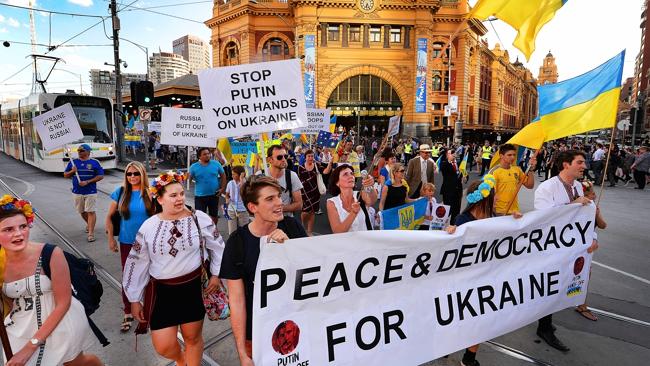Russian Military Presence in Ukraine Worries Nations and Students
Tensions have sustained for Ukrainians globally ever since the Russian invasion of Crimea on Feb. 28.
The citizen movement that overthrew now ex-President Viktor Yanukovych began last November, with people in Kiev protesting his broken promise to enact a trade agreement with the European Union in favor of closer ties to Russia. Earlier this year Ukrainian citizens suffered from violence decreed by their own authorities in an effort to stop the protests.
Now Russia’s presence in Crimea is straining the temporal Ukrainian government.
“Putin got scared once he saw he had no control over Ukraine, so he attacked,” said Mia Momot, sophomore political science major and native of Ternopil, Ukraine.
On March 3, Russia’s foreign minister said troops had been deployed to Crimea in order to protect ethnic Russians in the area from Ukrainian “ultranationalists.”
Others point out to the Russian military bases in Crimea, vestiges of an agreement following Ukraine’s separation from Russia, as an important factor in Russia’s tactic. Eugene Robinson from The Washington Post suggested that Russian president Vladimir Putin sent the troops out of belief that Russia’s bases may be under threat.
Some moves by the new Ukrainian government may have been seen as provocations or dangers, such as the repeal of a law that made Russian Ukraine’s second official language. Since this took place, as Tablet Magazine reported, Ukrainians have rejected the move and expressed solidarity toward Russian-speaking Ukrainians.
However, as of last Thur., March 6, the Crimean parliament had formally asked Russia’s government to be re-admitted into the Russian Federation. If Russia accepts this request, the people of Crimea would vote on secession from Ukraine on March 16.
“We don’t want to see Ukrainian land go to Russia. Nobody wants to be a part of the Soviet Union and be slaves to Russia,” Momot said.
According to sophomore applied psychology major Anastasiya Baltsevych, what is ultimately at stake is whether Ukraine will submit to Putin or become a free democracy.
“People aren’t receiving enough pension money and there are no opportunities for Ukrainian students,” said Baltsevych, in regard to living conditions in Russia. “Ukraine has lived in a bubble, under the influence of Russia, and Russia is not willing to let go.”
Baltsevych was born in Chernivtsi, a city in Western Ukraine, and moved to the United States with her family when she was seven. Her parents own an international trade business, and she believes that, were Russia to gain the upper hand in Ukraine, her parents’ business would be at risk.
Momot said she keeps track of both Russian and Ukrainian media since misinformation abounds.
“My mom and I are constantly checking the news, we are worried because our family is still in Ukraine,” Momot said. “We want to make sure we are getting the right information because of the media war spreading lies about military.”
A third Pace student directly affected by the Russian-Ukrainian conflict is sophomore Nataliya Borysyuk, a native of Ivano-Frankivsk, Ukraine. Her plans for this summer were cancelled due to the tension in her homeland.
“My parents grew up under the Soviet Union, it was a relief for them when Ukraine became independent,” Borysyuk said. “Now Ukraine’s freedom is at stake.”
Associate Professor of Finance Ronald Filante said Russia’s status as a petro-state grants it a huge power and influence over Ukraine and other European countries, such as Germany and Poland, since these nations depend on Russia for crude oil and natural gas. He feels this is partly why Western nations haven’t taken concrete economic measures against Russia’s military move, and also why the U.S. is pushing to make refined products and natural gas available for exportation to Europe.
“In the meanwhile, Russia’s influence will get weaker,” Filante said. “In 10 years, Europe would probably tell the Russians they don’t need them.”
Borysyuk’s mother is Russian, while her father is Ukrainian, which goes to show that there is no inborn hostility between Ukrainian and Russian citizens. Rather, it is an issue of political interests and power; interests that run the risk of ignoring the voice of a people who for over a decade have been wanting to live in their own skin.
Your donation supports independent, student-run journalism at Pace University. Support the Pace Chronicle to help cover publishing costs.


